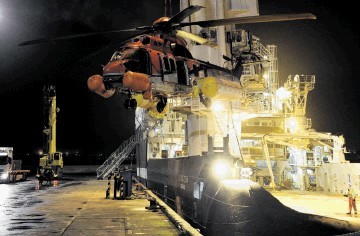
A MAJOR crack has been discovered in the gearbox of the Super Puma helicopter that ditched in the North Sea earlier this week, it emerged last night.
Officials from the Air Accidents Investigation Branch, who examined the CHC aircraft yesterday, said there had been complete failure of the gearbox and emergency back-up system.
The AAIB report was produced after the aircraft arrived back at Peterhead early yesterday.
It states that on initial examination a “360 degree circumferential crack on the bevel gear vertical shaft” was found “in the vicinity of the weld that joins two sections of the shaft. Therefore, the main and standby oil pump gears were no longer being driven.”
Seventeen oil workers and two crew had to be rescued from the North Sea on Monday after the EC225 helicopter ditched 14 miles west of the Fair Isle, south of Shetland.
The crew told the AAIB that lights on the helicopter’s central warning panel illuminated, indicating that all oil had drained from the main gearbox, and the emergency lubrication system, which is supposed to keep the gearbox going for 30 minutes, also failed.
The report said: “The crew of the helicopter carried out a controlled ditching following indications of a failure of the main gearbox (MGB) lubrication system and, subsequently, a warning indicating failure of the emergency lubrication system.
“All passengers and crew evacuated the helicopter and were subsequently rescued without injury.”
Speaking on the back of the latest report, aviation journalist Jim Ferguson said this latest incident was “far more serious” than the North Sea ditching of the Bond EC225 Super Puma earlier this year.
He said: “It is very unlikely we will be seeing an EC225 in the air any time soon. Although it is similar to the last incident, it is far more serious as the complete back-up lubrication system completely failed.”
On April 1 2009, 16 people died when a Super Puma plunged into the sea off the Aberdeenshire coast. The gearbox of that Bond-operated helicopter had also failed while returning from the BP Miller platform.
The tragedy happened about six weeks after another Bond Super Puma with 18 people on board ditched in the North Sea as it approached a production platform owned by BP. Everyone survived that incident.
All the offshore helicopter operators will now wait for safety guarantees before making a decision on whether to resume Super Puma flights.
CHC, Bristow and Bond Offshore Helicopters, have all grounded EC225 Super Pumas as a precaution.
Early information on the ditching was discussed at a meeting of the Helicopter Safety Steering Group (HSSG) in Aberdeen yesterday.
Speaking afterwards, team leader for step change in safety Les Linklater said: “The main concern is how we address workforce confidence, and how we make sure that, if and when we reintroduce flight operations, they are introduced in a very safe manner.”
Mr Linklater acknowledged “moving people is a challenge right now”.
He added that it was “far too early” to say when helicopter companies could resume normal operations, but said guarantees would be sought before any decision was made.
“We will hopefully have additional information in the next 24 hours,” he added.
The HSSG comprises offshore helicopter operators, oil and gas companies, pilots’ representatives, trade unions and regulators from the Civil Aviation Authority and the Health and Safety Executive. Unite and RMT union representatives said workers would be very concerned by reports that a gearbox problem had prompted the ditching.
The crew of another EC225 Super Puma ditched their aircraft about 30 miles off the coast of Aberdeen in May after what later turned out to be a false warning about a gearbox problem.
Jean-Pierre Dedieu, executive vice-president of manufacturer Eurocopter, has insisted the EC225 is safe. A statement issued by the company yesterday said: “Eurocopter is now working closely with the operators and the relevant investigative authorities to establish the root cause of the accident. Safety remains our top priority and we will provide further updates as soon as appropriate.”
A statement from CHC said the company was continuing to delay all scheduled commercial flights on Super Puma EC225 aircraft and was “participating fully” with the AAIB investigation.
Bond chief executive officer Richard Mintern acknowledged that the decision “may cause inconvenience”. But he said Bond was committed to the “highest standards of airworthiness” and would not compromise the safety of passengers and crew.
A statement from Bristow said: “Our affected aircraft will not fly until we are satisfied that it is safe to do so based on information provided by the AAIB and the manufacturer Eurocopter.”